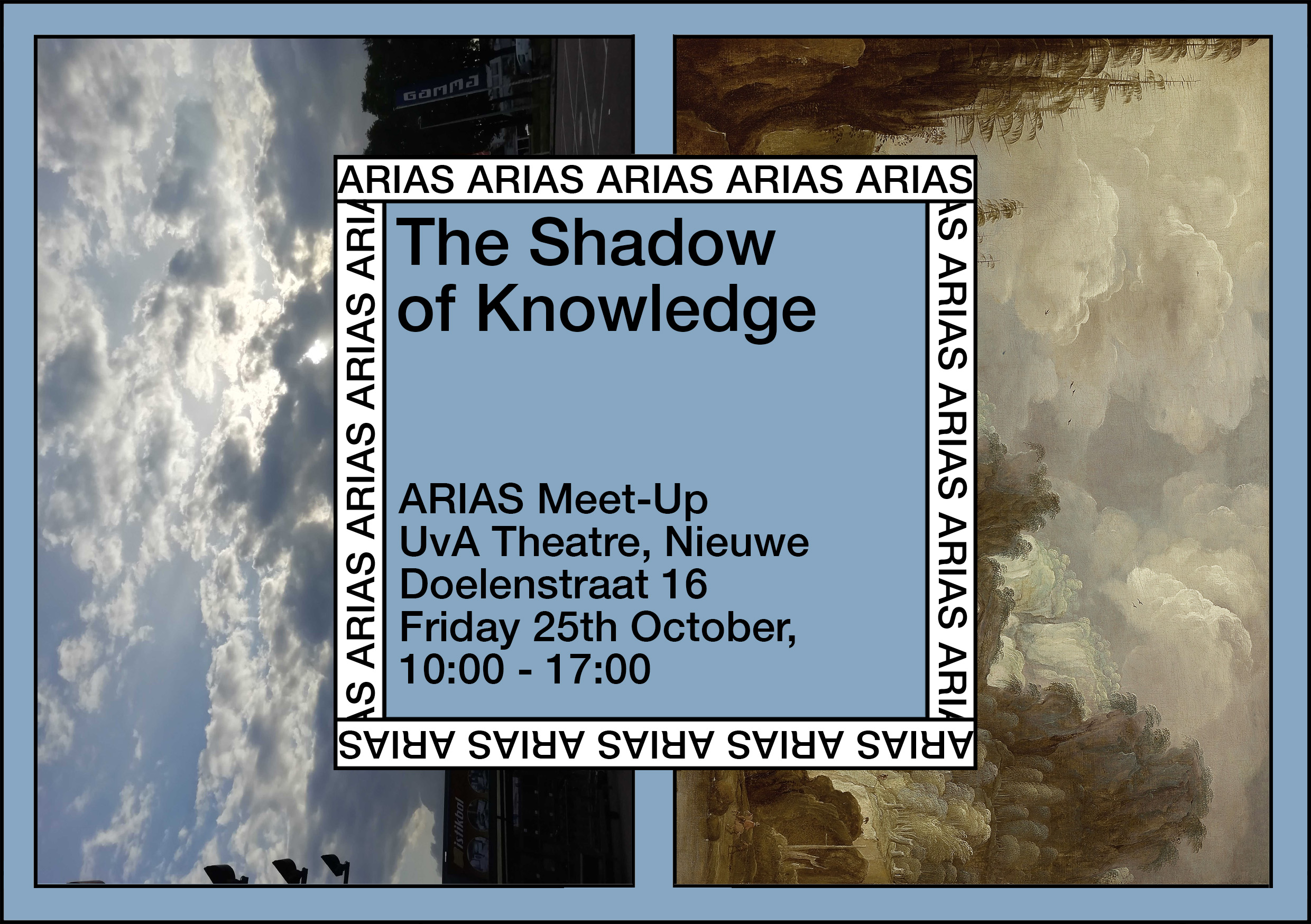25th October 2019: The Shadow of Knowledge, ARIAS Network Meet-up
Click here to see photographs.
The gaps – the not knowing – play a big role in artistic research: [It’s] not so much about the information that’s coming up, but [it’s the] shadow [of knowledge] which is the real research.’ -Falke Pisano – Beyond Language
As a platform for the arts, sciences and other social fields ARIAS searches to make place for research contexts, in which separate disciplines are not seen in opposition but (ideally) in entangled relations. Such practices of collaboratively working across difference are in development. As they widen the scripts of what research can be, they set exciting examples. Yet often these forms are still young and do not fit in with existing structures anymore: What are the conditions and contexts needed for collaborative transdisciplinary research that makes different and unforeseen ways of knowing possible and valuable?
Programme
10:00 Coffee & tea, Welcome
10.30 Introduction
10.45 Morning presentations by Ira Melkonyan, Ilse van Rijn, Eliza Steinbock & Imara Limon, Rosie Heinrich.
13:00 Lunch (bring your own).
14:00 Moderated round table talks with the speakers.
16:00 Closing presentation with Maartje Nevejan.
16.30 Drinks (borrel).
About the morning presentations and conversations,
presentation: Upstairs Geology, Controls and Conditions of Liquid Borders
Ira Melkonyan presented her artistic research titled “Upstairs Geology” that reclaims the word liquid to visually see how fluid substances can break structures, frames, architectures that erupt from her personal attitudes of fixity. Melkonyan experimented with thickened and coloured water, gravity, ropes, pumps, sunlight, snow, rain and sometimes people to demonstrate and propose new notions of borders. In materiality she creates liquid borders that reform, stretch, drip when pushed and pulled from other forces, handing over control, or thereby lack of, to the liquid. Nurturing the conditions needed for non-human and “alien” counterparts to manifest their knowledge, Melkonyan suggests such environments give ground to develop sensitivity to the unfamiliar ways of knowing for the human entities involved in the process.
Presentation: Radical Poetry as Material Intervention in Contemporary Art
A Prequel
“Poetry today might have more to teach us than economic science, the human sciences and psychoanalysis combined.” ~ Félix Guattari
The traditionally tenuous relationship between poetry and visual art has radically changed in recent years. Poetry permeates into art institutions, it being used as a form and means of expression by visual artists, varying from Karl Holmqvist to Otobang Nkanga, Gregg Bordowitz and Alice Creischer. The question arises how this highly disruptive and sensuous ‘language of excess’ (Bifo) functions. What is its operative force? Focusing on contemporary artists’ poetic works, this presentation by Ilse van Rijn discussed what it perceives as the potential of poetry within the realm of visual art. What makes poetry ‘the most concentrated way to concentrate experiences and senses and knowledge,’ in Creischer’s words?
Eliza Steinbock and Imara Limon
Conversation: Intersectional research approaches
Imara Limon and Eliza Steinbock are both grounded in the approach of cultural analysis that looks for the contemporary political relevance and resonance of any cultural production. While Limon works primarily as a curator and Steinbock as a university researcher, in this conversation, they discussed the ways in which their engagement with archival and museological practices tries to affirm what seems like “shadow” or subaltern knowledges. With renewed force, “outside” feedback from activist groups and grassroots organisations are reshaping institutions and the narratives they tell. Taking the particular case of the New Narratives program at the Amsterdam Museum (Limon) and the research program of the Critical Visitor (Steinbock), they discussed the tensions between professional applied knowledge and emergent or community knowledge, and the question of resilience within the heritage environment that is by definition exclusive, selective, conservative. What methods of producing knowledge serve our communities and which tend to shore up institutions? How might institutional critique enable our collective resilience?
Presentation: Listening through ‘We always need heroes’
Rosie Heinrich presented her multidisciplinary project ‘We always need heroes’ that surveys the contemporary state of our narrative landscapes against the backdrop of Iceland’s ‘cultural crash’ upon the banks collapsing in 2008. The art of reframing and rephrasing, discursively creating and conveniently forgetting, the misconstrued, the black holes, the blind spots: ‘Alternative facts’ have always been present in the making of our histories, nations, self-storytelling and -imaging. Through Heinrich’s practice of dialogue and close listening she considers its potential for multiperspective exchange and articulation of new insights – paying close attention to the slippages and gaps innate to interpretation.
In the afternoon these contributions and the issues they brought up were further discussed in different moderated table talks with our guests.
Before the day came to an end with drinks & bites, Maartje Nevejan took us into the arts and sciences of Absence with her multifaceted project If You Are Not There, Where Are You?

Date
October 25, 2019
Time
10:00am
Location
UvA Theatre

